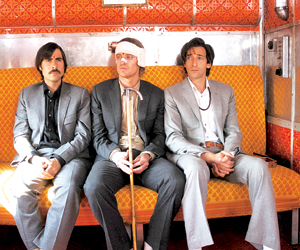LITTLE ROCK — Wes Anderson's movies are hothouse flowers, delicate but vivid blooming, fragrant but short-lived. I remember loving Bottle Rocket, Rushmore and even The Royal Tenenbaums, but I don't think I could write plot synopses for any of them without cheating. I even liked The Life Aquatic With Steve Zissou, and I know I can't tell you what that film was about.
People want a lot of different things out of the movies, but most of us don't want to feel excluded from a film's central conceit. That's why so many people get angry at Anderson's movies. He can be oblique and obscure; his movies are about as populist as a New Yorker poem.
Movie
Darjeeling Limited ******** 1/2
Cast: Owen Wilson, Jason Schwartzman, Adrien Brody, Wally Wolodarsky, Angelica Huston<br /> Director: Wes Anderson<br /> Rating: R, for language
Sometimes you get exactly what he's doing - the British Invasion soundtrack of Rushmore, the J.D. Salinger pastiche that is The Royal Tenenbaums - but you don't always get it. At least I don't. I've come to understand Anderson as a sublime visual filmmaker, an artist who works well with lines and colors and who has devised a distinct style with cinematographer Robert Yeoman.
But people who don't like his work have a point - his preciousness intrudes on his storytelling, and his little homages to Jacques Henri Lartigue and the like become annoying. (How is Wes Anderson like Michael Bay?They both magpie images from other sources. Anderson's taste is just more esoteric and less bombastic than Bay's.)
So consider this a half-hearted endorsement of Anderson's latest, The Darjeeling Limited, which is in some ways the least of his films and in some ways the least stilted. Usually it's hard to identify the problems with Anderson's films, but in this case it's easy: Darjeeling isn't as funny or wise as it needs to be.
It's not a spoiler to say the film is about baggage - emotional and actual. And that the much discussed suitcases designed by Marc Jacobs for Louis Vuitton are one of the most heavy-handed symbols a smart filmmaker has ever tried to smuggle past a presumably alert audience.
This half-baked quality might be explained by the fact that Darjeeling was largely written on the fly by Anderson, Jason Schwartzman and Roman Coppola as they traveled through the subcontinent shooting the film.
On the other hand, the improvisational, serendipity-driven method of filmmaking lends the movie a pleasant breeziness, and the teaming of Schwartzman, Adrien Brody and Owen Wilson as estranged brothers is a better idea than might at first be presumed. They don't resemble each other, but each has a distinctive nose and a kind of sad clown set to his eyes. Bill Murray also appears briefly as an unidentified businessman who isn't (but could have been) their late father.
They haven't spoken for a year, since the debacle of their father's funeral, and they're only together now thanks to the logistical discipline of eldest son Francis (Wilson), who has booked a trip across the Rajasthani desert. Francis views the journey as a chance for spiritual refreshment and reconnection - with the help of his put-upon personal assistant Brendan (Wally Wolodarsky), he has compiled (and laminated) a detailed itinerary for the trip.
Apparently Peter (Brody) and Jack (Schwartzman) have agreed to the trip to escape the circumstances of their personal lives. Jack has just suffered a rough breakup with his girlfriend (Natalie Portman in a cameo), while Peter's wife is about to deliver their first son, about which he feels oddly numb. There's also a sense of a familial inevitability to the trip; they resent Francis but they can't resist him.
Francis is also on the run - although he's absurdly wealthy, he's recovering from a near-fatal motorcycle accident that chillingly prefigured Wilson's alleged suicide attempt. He spends most of the movie with his face bandaged. The moment when he appears unmasked provides the script with another opportunity to make a groaningly obvious observation.
Darjeeling recycles Anderson's familiar themes - nostalgia, yearning for meaning, lovely music - and in its best moments attains a wistful grace. As usual with Anderson, it's very personal, and it's probably impossible for anyone, even the auteur himself, to precisely know what all is being worked out here.
"I wonder if the three of us would've been friends in real life," Jack says at one point, "not as brothers, but as people."
The answer is obviously not; all these brothers share is perforce by blood, the rights and obligations that family obtains.
MovieStyle, Pages 41, 43 on 10/26/2007
